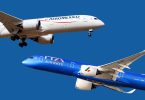D'Lufthansa Group setzt sech weider fir säi laangjärege Engagement fir d'Klimafuerschung auszebauen, an huet zesumme mam Jülich Research Center en drëtte Fliger a senger Gruppeflott mat Miessinstrumenter ausgestatt. Effektiv direkt sammelt en Airbus A330 vun Eurowings Discover kontinuéierlech Miessdaten an der Atmosphär. De retrofitted Laangstreckefliger vun der Fräizäit-Airline vun der Lufthansa Group mat der Registréierung D-AIKE, "Kilo-Echo", flitt a weltwäit geplangte Service mat Destinatiounen an Nordamerika, der Karibik, dem Indeschen Ozean an Afrika.
For more than seven years, Lufthansa has been operating two long-haul aircraft equipped with the measuring system from the European research project IAGOS (In-service Aircraft for a Global Observing System). Due to the now additional A330, the Lufthansa Group will be able to collect climate data for science on additional flight routes around the globe.
“We are proud to now be able to support the IAGOS project with a third long-haul aircraft. Over the past 30 years, the data collected with our aircraft has contributed significantly to building one of the world’s most comprehensive data sets of ozone and water vapor content in the atmosphere. With our commitment, we are making an important contribution to climate research,” said Christina Foerster, Member of the Lufthansa Group’s Executive Board, responsible for Brand and Sustainability.
Under the leadership of the Jülich Research Center, IAGOS bundles the expertise of partners from research, weather services, the aviation industry and airlines. IAGOS Germany is funded by the German Federal Ministry of Education and Research.
“Thanks to the long-standing support of the Lufthansa Group, IAGOS has been able to develop into a research infrastructure of international standing and occupies a central place in the global system for observing the atmosphere. We welcome the ‘Kilo-Echo’ as a new member of the family and look forward to further deepening cooperation with the Lufthansa Group. We hope that our measurements will also help to reduce the climate impact of air traffic in the future,” said Prof. Andreas Petzold, coordinator of IAGOS Germany at the Jülich Research Center.
The compact system of the European research project is permanently installed below the aircraft cockpit. A short connection leads from there to two measuring probes installed in the aircraft fuselage. After each flight, the recorded measurement data are automatically transmitted to the central database of the CNRS (Centre National de la Recherche Scientifique) research center in Toulouse. The findings are freely and openly accessible for global research and are currently used by around 300 organizations worldwide. They help researchers gain new insight into climate development, the composition of the atmosphere and determining long-term changes to make climate models more precise and to improve weather forecasts.
30,000 Lufthansa flights for climate research
The Lufthansa Group’s first IAGOS aircraft, the Airbus A340-300 “D-AIGT,” has already been in service since July 8, 2011. On that day, Lufthansa became the world’s first airline to take off with the new IAGOS measurement system. The predecessor system, MOZAIC, was also installed on two Lufthansa Airbus A340-300s and reliably collected measurement data in cruise flight until 2014. In February 2015, the second IAGOS system was installed at Lufthansa on the Airbus A330-300 “D-AIKO”. Together with the converted third aircraft, a total of ten aircraft at seven airlines worldwide are now equipped with the IAGOS system. Around half of the more than 60,000 flights with MOZAIC and IAGOS measuring devices were operated by Lufthansa.






















